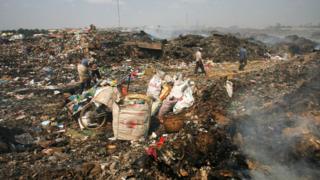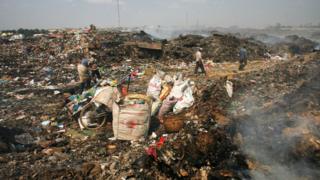Doch Chkae, the metal band born on a rubbish dump
Doch Chkae began life on a Cambodian rubbish dump, but now play to thousands. …

 Image copyright Satoshi Takahashi/Getty Images
Image copyright Satoshi Takahashi/Getty Images It was the most powerful symbol of the poverty under which many lived in mid-2000s Cambodia: a vast rubbish dump on the outskirts of the capital.
For many, the Stung Meanchey dump near Phnom Penh was home. About 2,000 men, women and children would sift through the 100-acre mountain of rubbish in appalling conditions looking for recyclables to sell.
Stung Meanchey was also a dangerous place. Some were crushed by dump trucks while jostling to get a prime spot when waste was released. People would fall ill through exposure to open sewage and harmful toxins.
Among those born in the dump were Sok Vichey, Ouch Theara and Ouch Hing. “We’d have no food for days, we just hung around the city with plastic bags to pick up cans to sell,” Vichey, 18, says.
“It was very hot under the sun and we had no water. We didn’t go to school. We had no choice.”
Theara’s mother had died and his father had left. He was living with his aunt and her seven children on Stung Meanchey. Vichey lived next door and had also lost his father. His mother spent her days sifting through rubbish on the dump for a couple of dollars a day.
They were not alone. In 2007 about 47% of Cambodians were living in poverty, according to the World Bank in Cambodia, with many living on less than a dollar a day.
By the time Theara, Hing and Vichey had reached their teens, their remaining family members could no longer provide for them and they were placed in the care of local NGO Moms Against Poverty.
It was there they met Swiss-German social worker Timon Seibel.
The boys’ childhood on the dump had left them angry, and unable to control that anger. “Especially Theara,” Timon says. “He has this attitude of the strongest wins and everything he has or can get he needs to fight for it.
“He could never really accept his fate of not having parents. When he’s manic, he’s super active and happy but then he falls into a big depression. In between he used to have these really, really strong attacks of fury. He would beat other kids and threaten them.”
Theara went to see a therapist who recommended trying to find his father. He eventually found him and discovered he was a wealthy architect who had never told his family about Theara. His father started giving him money, but then decided he wanted to sever contact again.
Timon tried everything to ease the boys’ anger – football, art classes – but nothing worked. Running out of ideas, Timon, a fan of metal music, took them to see Cambodian hardcore pioneers Sliten6ix perform at a bar in Phnom Penh.
Finally, something clicked.
“I just stood in front of the stage and was like what […] is this music?” Vichey says. “I didn’t understand what they were singing. The drums and guitars, I really didn’t understand.
“But after the show we got interested in this kind of music, it was quite easy to play so we started jamming.”
Timon introduced them to the likes of Slipknot and Rage Against The Machine and the boys immediately identified with the aggressive nature of the music – a far cry from the sentimental love songs adored by many Cambodians.
“I like metal more because we can scream out our anger and we can play whatever we want,” Vichey says. “We go to the music room, just turn on the amp and release our anger inside. It’s been a really hard life in the past.”
It was then that the boys decided to start a band – Doch Chkae.
Meaning “like a dog”, the band wanted a name that represented how society made them feel as garbage pickers living in abject poverty. This comes across in their lyrics, screamed in their native Khmer.
Nobody has a life like me,
Every day I live like a dog,
We look for our food, walking the streets,
I pick up the waste wherever I find it,
If I didn’t do that, I wouldn’t even have this life,
I do that because I don’t have parents
Doch Chkae started playing shows around Phnom Penh in 2015 and released singles including Kham Knea Doch Chkae (Bite Each Other Like Dogs) on Yab Moung Records, Cambodia’s only heavy rock record label.
Nina Ruhl, who lived in Phnom Penh but has since moved back to her native Germany, became a fan of the band after seeing them play live.
“You can see the crowd they are like: ‘Oh they are cute’ and then they start playing and immediately the energy changes in the room and people will jump and head bang and see them from a whole different perspective,” she says.
“I never liked metal music before but when I see the guys I go nuts.”
Doch Chkae started making small waves on the world’s metal scene and in 2018 were invited to play Wacken Open Air in Germany, one of the biggest metal festivals on the planet. But their visa was denied after German authorities deeming the band a flight risk. “In normal language? They were too poor,” Timon says.
Many from the metal community were furious about the decision and more than 10,000 signed an online petition calling for authorities to reconsider. The band was eventually granted a visa and in August, played a triumphant show at Wacken before a crowd of thousands.
“I was so excited,” lead vocalist Theara, now 20, says. “We played eight songs, finished and they were shouting: ‘One more song.’ They looked really happy, they wanted us to keep going.
“I’d never seen anything like that before. There were so many people.”
Despite playing to a crowd size almost unheard of for Cambodian bands outside the country, the media there continue to show little interest in Doch Chkae.
“Nobody came to interview us, it was silence,” Theara says. “They don’t like that music, there’s lots of screaming and it’s fast. They don’t understand it.”
There are plans for a new workshop led by the band, which will introduce heavy music to other young Cambodians struggling in poverty. The band hope music will inspire others, like it did for them.
The Stung Meanchey dump was closed a decade ago although many still live and work there. Poverty has dropped considerably in Cambodia in recent years, although many continue to be left behind amid the country’s rapid economic growth.
Despite their success in Germany, the band members are still living a hand-to-mouth existence, doing odd jobs and selling merchandise online when not rehearsing or playing live.
Doch Chkae are recording a new EP and hope to embark on a tour of Europe after its release. Although they feel ignored by many in their homeland, metal music – and the interest of the metal-heads of Europe – has given them hope for the future.







